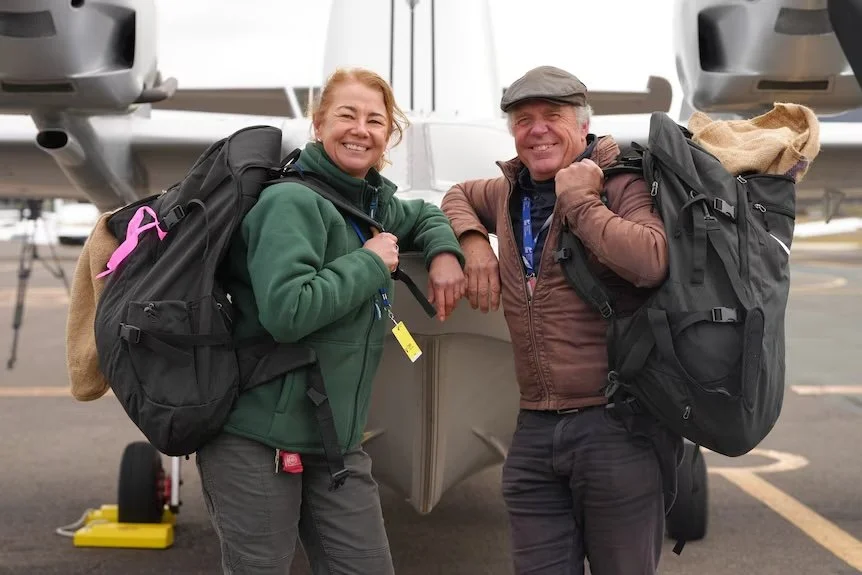Wallabies airlifted in race to avoid extinction
It’s a rare sight to see critically endangered southern brush-tailed rock-wallabies (SBTRW) loaded into backpacks and onto a small plane, yet that’s exactly what is happening at Odonata Foundation’s Mt Rothwell Sanctuary in Little River this Friday in a bid to save the species from extinction.
At 8am on Friday August 1, six wallabies – three male and three female – that have been meticulously selected and genetically screened at Odonata’s Mt Rothwell Sanctuary, will board a chartered flight from Little River in Victoria to their new home in Tidbinbilla Nature Reserve (TNR) in the ACT. This will help to strengthen the founder population of SBTRWs in the reserve in a bid to save the critically endangered population from extinction.
The six wallabies will be trapped in Odonata’s Mt Rothwell Sanctuary before they travel in a quirky yet critical style - each transported in their own individual backpack, via a small plane - an approach adopted to reduce stress on the animal. It is a rare event for this method of interstate transportation to be adopted outside of bushfire evacuation, and has been enabled by a partnership with Tidbinbilla Nature Reserve and a three-year commitment by Amazon Australia to support Odonata’s recovery programs.
With less than 100 of these wallabies left in the wild, due to predation and habitat loss, the Recovery Team and its partner organisations have been in the fight of their lives to bounce this unique irreplaceable population of BTRWs back from the brink of extinction.
“Australia holds the unenviable title of being the world leader in mammal extinctions, at Odonata we’re looking to reverse this trajectory. We’re thrilled to be home to the most successful breeding program of the southern brush-tailed rock-wallaby at our Mt Rothwell Sanctuary in Little River,” says Matt Singleton, Chief Operating Officer, Odonata.
“We now have a genetically robust and thriving population of over 300 wallabies at Mt Rothwell, however, the next challenge is to create multiple insurance populations in ideal habitat so that one extreme weather event doesn’t risk the survival of the species,” explains Mr Singleton.
This approach is in line with the work of the Southern Brush-tailed Rock Wallaby Recovery Team (of which Odonata is a member), whose plan includes the establishment of at least two geographically separated safe havens. This flight is a further step towards building healthy populations for wild introductions over time.
After a short quarantine period, TNR will add the six additional wallabies to their founding population within the Jedbinbilla Safe Haven, increasing genetic diversity and improving the prospects that this critically endangered population will survive.
Whilst the species recovery effort has been decades in the making, it recently received an incredible boost, thanks to Amazon’s Right Now Climate Fund, which is investing in Odonata’s We Save Species Recovery Programs.
“Saving species takes an incredible amount of grit, time and money. Odonata is thrilled to have the support of Amazon Australia to fast track and scale our recovery efforts,”
"We're incredibly proud to support Odonata Foundation,” said Janet Menzies, Amazon Australia Country Manager.
“Since establishing our first fulfilment centre in Melbourne, we've seen firsthand Australia's unique biodiversity and understand the need to help protect it. This groundbreaking initiative represents exactly the kind of innovative, science-based approach needed to tackle Australia's extinction crisis at scale. By backing the Odonata Foundation's work to rebuild viable populations of our most threatened native species, we're investing in Australia's natural heritage for future generations.”
In addition, TNR have provided Odonata with two wallabies. These are ‘genetically bespoke’ wallabies that have been bred as part of the ACT Government’s ‘genetic rescue’ breeding program designed to improve the genetic constitution of this critically endangered population. These wallabies will be translocated to Odonata’s partner safe haven, Barbaloot in the Strathbogie Region of Victoria.
“When starting a new colony, the founder population is of critical importance, so a lot of work goes into ensuring the genetics are just right,” says Dale Crisp, Odonata Species Program Manager.
“We’re excited to be working with TNR to improve the genetics across populations, and to harness collaboration with the ACT Government and our recovery partners to ensure the survival of this important species. The hope is they will thrive in the wild again one day,” says Ms Crisp.
Special thanks to the ACT Government, Amazon, Tidbinbilla Nature Reserve, Cesar Australia and the SBTRW Recovery Team for making this trip possible.
Read the full article here.
Dr Sarah May and pilot Michael Smith with bags of wallabies (ABC News: Lily Nothling)

